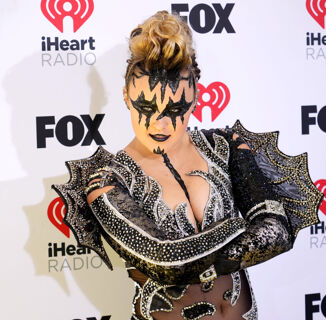Pride hasn’t even arrived yet, and we’re already drowning in discourse. This isn’t unusual: what would Pride be without endless arguments about kink, beer, and big box store displays?
But there’s a bigger problem we’re dealing with this Pride: the fact that last year’s Dylan Mulvaney Bud Light fracas has caused several companies to scale back their investment in Pride displays. Folks are taking this news with a grain of salt, with many taking the opportunity to point out that we should be going straight to the source for our Pride merch: i.e. queer creators who won’t ever turn on their own community after a round of backlash.
But there’s more to this story, as TikToker and podcaster Don Martin recently shared on TikTok.
Your internet debrief
Stay ahead of the most scandalous, hilarious, and mind-boggling internet content delivered directly to your inbox twice a week.
While yes, Gen Z commenters urging consumers to buy direct from queer creators do have a strong point, there’s a historical perspective to consider here. “I need you to understand,” Martin explains, “that if your formative years happened in a post-Obergefell world…I need you to maybe speak little and listen much right now.”
Referring to Obergefell v. Hodges, the landmark Supreme Court decision that codified the right to marriage for all Americans regardless of queerness. Martin goes on to explain that it’s hard for folks who came of age after the case to understand the context that millennials and older queer folks are informed by. If you grew up in a post-Obergefell climate, Martin explains, “you probably had access to not just one Pride parade but several Pride parades, within driving or walking distance.” He goes on to explain the other benefits that younger generations might take for granted, including access to queer content and merchandise, and the ability to visit partners in the hospital and get them on shared health insurance.
But many of us remember a different time, one where we couldn’t see queer stories portrayed in a positive light on mainstream TV or in movies. We lived through Prop 8, the California state amendment that denied queer couples the right to marry, before we saw its overturning. Growing up, it was hard for us to find evidence of queerness around us, much less any kind of celebration of our identity.
“When you grow up with something like [the right to gay marriage] happening before your formative years, it feels permanent,” Martin says. “It feels like something that has always been there, and you don’t have a true appreciation for how it came to be and how fragile the rights are.”
We’ve seen how fragile they can be, not only during Trump’s presidential term, but in the past few years as we’ve seen corporations, streaming services, and once queer-friendly brands grow more conservative toward us in the wake of anti-queer backlash.
Related:
GOP lawmaker presents his “scientific fact” that God exists and suggests schools teach it
Senator Glenn Greunhagen has consistently voted against queer rights.
So yes, Martin explains, seeing Pride merch in big box stores—as problematic as many of them are—is meaningful to many. While we can fundamentally disagree with rainbow capitalism as a concept, we can also mourn the loss of a climate in which trans rights weren’t seen as some kind of wedge issue to drive God-fearing voters to the polls to vote for traditionalist ghouls.
Giving our money directly to queer artists is definitely the preferred way to get Pride merch, for those who can afford it. But it’s also hard to deal with the signs of progress being dialed back even in a seemingly superficial way.
“It meant something for queer folks in rural areas to see themselves reflected in these big box stores,” Martin continues. That’s a loss that we need to consider before we enter Pride season.
“We shouldn’t be fighting each other right now,” Martin concludes. “We need to keep our eyes on what’s important, and stop shaming people for finding pride wherever they can find it.”
Don't forget to share:
Help make sure LGBTQ+ stories are being told...
We can't rely on mainstream media to tell our stories. That's why we don't lock our articles behind a paywall. Will you support our mission with a contribution today?
Cancel anytime · Proudly LGBTQ+ owned and operated
Read More in The Internet
The Latest on INTO
Subscribe to get a twice-weekly dose of queer news, updates, and insights from the INTO team.
in Your Inbox














